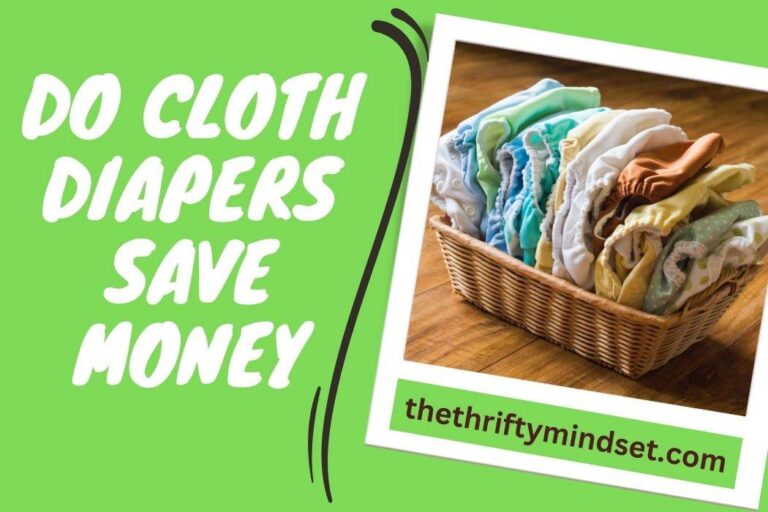In the quest to balance budgets and nurture our little ones, the cloth diaper debate takes center stage. Are they truly the penny-savers they’re touted to be? Amidst rising living costs and environmental concerns, parents are increasingly curious: can switching to cloth diapers significantly trim expenses?
This article explores the heart of this dilemma, unraveling the real cost implications of cloth versus disposable diapers, and offering practical insights for families seeking both financial prudence and the best for their babies.
Yes, cloth diapers can save money, especially over the long term. While they require an initial investment, the ongoing costs are typically lower than disposables, with potential savings of hundreds to thousands of dollars over a child’s diapering period.
Smart Ways To Economize With Cloth Diapers
1. Buy in Bulk or Bundles

Purchasing cloth diapers in bulk can offer significant savings. For example, some brands like cloth diaper offer up to 20% off on bulk purchases.
2. Choose One-Size Diapers
One-size diapers adjust to your baby’s growth, eliminating the need to buy different sizes. This can save hundreds of dollars over the diapering period.
3. Opt for Pre-Owned Diapers
Buying gently used cloth diapers can cut costs by up to 50%. Ensure they are in good condition to maximize their lifespan.
4. Resell After Use
High-quality cloth diapers retain a good resale value. You can recoup up to 50% of the initial cost by selling them after use.
5. Use Energy-Efficient Laundry Practices
Washing in cold water and line drying can save approximately $0.50 per load, amounting to significant savings over time.
6. DIY Cloth Wipes
Homemade cloth wipes can be made from old towels or t-shirts, saving an average of $300 compared to buying disposable wipes over 2.5 years.
7. Limit Specialty Diapers

While tempting, limit the purchase of specialty or designer diapers. Stick to functional and affordable options.
8. Efficient Diaper Rotation
A moderate stash of about 24 diapers is sufficient. Efficient rotation reduces wear and tear, extending their lifespan.
9. Maximize Diaper Use
Use the same cloth diapers for subsequent children, doubling or even tripling your savings.
10. Care for Diapers Properly
Proper maintenance can extend the life of cloth diapers. Avoid fabric softeners and high heat, which can degrade fabric and reduce absorbency.
Reasons to Use Cloth Diapers Over Disposables
Long-Term Cost Savings
- Cloth diapers can save a family about $1,000 to $1,200 per year compared to disposables, especially when used for multiple children.
Reduced Weekly Expenses
- Unlike disposables, cloth diapers are a one-time purchase, significantly reducing weekly grocery bills.
Avoidance of Price Inflation
- Cloth diapers protect from the fluctuating costs of disposables, which can rise due to market changes or inflation.
Savings on Waste Disposal:
- Using cloth diapers can reduce garbage disposal costs. Some municipalities charge fees based on waste volume.
Early Potty Training
- Children in cloth diapers may potty train earlier, leading to fewer diapering years and additional savings. This can cut down the diapering period by several months, saving further costs on diapers.
Breaking Down The Cost Of Cloth Diapering
Initial Cost of Diapers
10 Cloth Diapers
Average cost per diaper: $15 – $25
Total initial cost: $150 – $250
20 Cloth Diapers
Average cost per diaper: $15 – $25
Total initial cost: $300 – $500
Additional Costs (Laundry, Accessories):
Laundry Costs
Average cost per load (washing and drying): $0.50 – $1.50
Frequency: 3 loads per week for 10 diapers, 2 loads per week for 20 diapers
Accessories (wet bags, liners, etc.):
Estimated additional cost: $50 – $100
Conclusion
The decision to use cloth diapers is not only an environmentally conscious choice but also a financially savvy one. Despite the initial investment, the long-term savings are undeniable. Families can save a significant amount over the diapering years of their child, especially when these diapers are reused for subsequent children.
While cloth diapering demands more time and effort in terms of laundry and maintenance, the reduction in recurring costs compared to disposable diapers makes it a cost-effective solution.
Ultimately, cloth diapers offer a blend of economic benefits and environmental responsibility, making them a compelling choice for budget-conscious and eco-aware parents.
I’m Grayson Watson, your frugal companion and the brain behind this money-saving extravaganza. Strap yourself in, because we’re about to embark on a wallet-friendly adventure like no other. Learn More!

